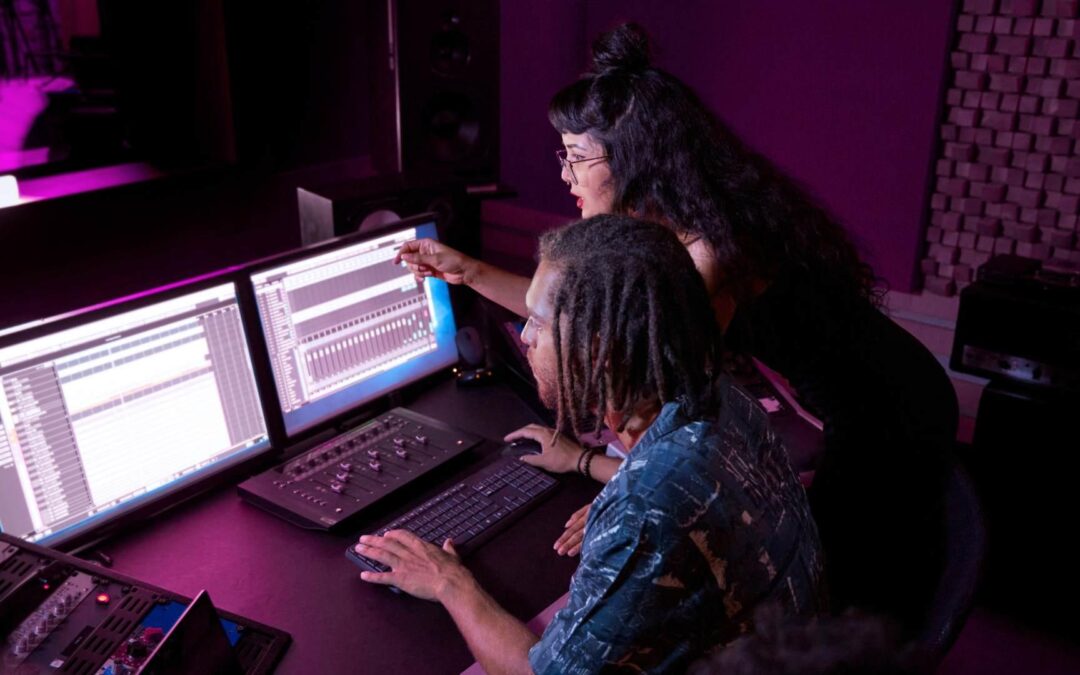A Bachelor’s degree in Music Production opens up numerous career opportunities for aspiring producers, engineers, and artists. Whether you dream of working in a recording studio, producing albums, or working in post-production for film and television, a degree from a top institution like Musicians Institute provides you with the skills and experience necessary to excel in the competitive world of music production.
In this blog post, we’ll explore what a Bachelor’s degree in Music Production and Engineering offers and why it’s the perfect choice for those passionate about music and technology.
1. Comprehensive Learning of Music Production and Engineering
One of the primary benefits of a Bachelor’s degree in Music Production is the comprehensive curriculum that covers both the technical and creative aspects of music production. At Musicians Institute, students gain an in-depth understanding of how to produce high-quality music, from the fundamentals of sound engineering to advanced recording techniques.
Students learn everything from sound mixing, mastering, and editing to the nuances of audio engineering in real-world environments. Audio engineering degree programs typically cover the basics of signal flow, acoustics, and studio setup, as well as more advanced topics like mixing in a DAW (digital audio workstation), sound design, and production for film, television, and video games.

Blog Post
"*" indicates required fields
By submitting this form, I authorize Musicians Institute (MI) to make or allow the placement of calls, emails, and texts to me at the phone number that I have provided, including through the use of automated technology, or a prerecorded or artificial voice. I understand that I am not required to provide my phone number as a condition of purchasing any property, goods, or services. I agree to the terms of MI’s Privacy Policy. MI will not sell or rent your information to third parties, and you may unsubscribe at any time.
2. Hands-On Experience with Industry-Standard Equipment
Musicians Institute emphasizes hands-on learning. Students in the audio engineering school have the opportunity to work with industry-standard equipment, including analog and digital consoles, advanced microphones, and high-end recording software. This practical experience is invaluable in preparing students for real-world scenarios.
At Musicians Institute, students work in state-of-the-art recording studios, gaining first-hand experience in mixing, mastering, and producing tracks, which is critical for future success in the audio engineer career path. This exposure to cutting-edge tools is one of the reasons why Musicians Institute is recognized among the best music engineering schools and audio engineering schools in the world.
3. Knowledge of Various Music Genres and Styles
An essential part of any audio engineering degree is learning how to work with a variety of music genres. Students are taught how to adapt their production techniques to match different styles of music, whether they’re producing hip hop, rock, electronic, or classical music. This versatility is vital for students planning to work as producer engineers in a diverse and ever-changing industry.
With a sound engineering degree from a renowned institution like Musicians Institute, students are equipped to work across different genres, providing them with a competitive edge in the music production field.
4. Exposure to Songwriting and Composition
Beyond just production skills, a Bachelor’s degree in Music Production often includes elements of songwriting and music composition. This is particularly beneficial for students interested in the creative side of music. By learning how to compose music and write lyrics, students can contribute more effectively to the creative direction of a project.
Some programs, like those offered at Musicians Institute, integrate music theory and composition into the curriculum, allowing students to develop as both producers and songwriters. This knowledge is highly valuable for audio production schools that aim to provide a holistic approach to music production education.
5. Career Opportunities and Industry Connections
Graduating with a degree in audio engineering from Musicians Institute opens the door to a wide array of career paths in the music industry. Whether you’re interested in becoming a recording engineer, audio producer, or a mixing engineer, your degree will serve as a strong foundation for these roles.
Musicians Institute has built a reputation for providing students with valuable industry connections. With access to audio engineering certificate programs, internships, and workshops with industry professionals, students have the opportunity to network and build their careers even before they graduate. Many alumni of Musicians Institute have gone on to work with top artists, producers, and labels in the industry.
6. A Stepping Stone for Further Specialization
A Bachelor’s degree in Music Production and Engineering can also serve as a stepping stone for further specialization. Many graduates go on to pursue advanced education in specialized areas like music engineering programs, recording engineer programs, or even music sound engineering schools to refine their expertise. If you’re considering an audio engineering degree, this is a great way to start your journey into the technical aspects of music and sound production.
Conclusion
Choosing to pursue a Bachelor’s degree in audio engineering from a prestigious institution like Musicians Institute provides a comprehensive education in both the technical and creative aspects of music production. With access to cutting-edge technology, hands-on training, and industry connections, you will be well-prepared for a career in the competitive world of music production. Whether you’re looking to work as a music engineer, audio producer, or recording engineer, the skills you gain from Musicians Institute will set you up for success.

